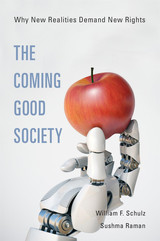
Two authors with decades of experience promoting human rights argue that, as the world changes around us, rights hardly imaginable today will come into being.
A rights revolution is under way. Today the range of nonhuman entities thought to deserve rights is exploding—not just animals but ecosystems and even robots. Changes in norms and circumstances require the expansion of rights: What new rights, for example, are needed if we understand gender to be nonbinary? Does living in a corrupt state violate our rights? And emerging technologies demand that we think about old rights in new ways: When biotechnology is used to change genetic code, whose rights might be violated? What rights, if any, protect our privacy from the intrusions of sophisticated surveillance techniques?
Drawing on their vast experience as human rights advocates, William Schulz and Sushma Raman challenge us to think hard about how rights evolve with changing circumstances, and what rights will look like ten, twenty, or fifty years from now. Against those who hold that rights are static and immutable, Schulz and Raman argue that rights must adapt to new realities or risk being consigned to irrelevance. To preserve and promote the good society—one that protects its members’ dignity and fosters an environment in which people will want to live—we must at times rethink the meanings of familiar rights and consider the introduction of entirely new rights.
Now is one of those times. The Coming Good Society details the many frontiers of rights today and the debates surrounding them. Schulz and Raman equip us with the tools to engage the present and future of rights so that we understand their importance and know where we stand.
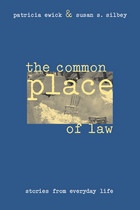
One narrative is based on an idea of the law as magisterial and remote. Another views the law as a game with rules that can be manipulated to one's advantage. A third narrative describes the law as an arbitrary power that is actively resisted. Drawing on these extensive case studies, Ewick and Silbey present individual experiences interwoven with an analysis that charts a coherent and compelling theory of legality. A groundbreaking study of law and narrative, The Common Place of Law depicts the institution as it is lived: strange and familiar, imperfect and ordinary, and at the center of daily life.
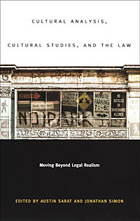
Drawing on legal scholarship, literary criticism, psychoanalytic theory, and anthropology, the essays collected here exemplify the contributions cultural analysis and cultural studies make to interdisciplinary legal study. Some of these broad-ranging pieces describe particular approaches to the cultural study of the law, while others look at specific moments where the law and culture intersect. Contributors confront the deep connections between law, social science, and post-World War II American liberalism; examine the traffic between legal and late-nineteenth- and early-twentieth-century scientific discourses; and investigate, through a focus on recovered memory, the ways psychotherapy is absorbed into the law. The essayists also explore specific moments where the law is forced to comprehend the world beyond its boundaries, illuminating its dependence on a series of unacknowledged aesthetic, psychological, and cultural assumptions—as in Aldolph Eichmann’s 1957 trial, hiv-related cases, and the U.S. Supreme Court’s recent efforts to define the role of race in the construction of constitutionally adequate voting districts.
Contributors. Paul Berman, Peter Brooks, Wai Chee Dimock, Anthony Farley, Shoshanna Felman, Carol Greenhouse, Paul Kahn, Naomi Mezey, Tobey Miller, Austin Sarat, Jonathan Simon, Alison Young

"Professor Kahn's perspective is neat and alluring: We need a form of legal scholarship released from the project of reform so that we can better understand who and what we are. The new discipline should study 'not legal rules, but the imagination as it constructs a world of legal meaning.' . . . [C]oncise, good reading, and recommended." —New York Law Journal
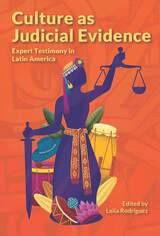
Culture as Judicial Evidence in Latin America summarizes the current state of this work in six countries: Mexico, Costa Rica, Peru, Chile, Colombia, and Uruguay, and lays out the challenges and dilemmas involved in the creation and use of cultural expert testimony. Organized into three sections, the book advances a framework for the use of cultural evidence, and presents readers with nine case studies based on trials in six individual countries. These countries have implemented legal reform, constitutional amendments and the adoption of international legislation to create the legal frameworks that enable this new form of legal evidence to be admissible in Latin American courts. The contributing authors are cultural anthropologists with vast experience researching the impact of cultural expert witness testimony. A forward-looking final section examines the dilemmas and challenges of this work that remain to be solved.
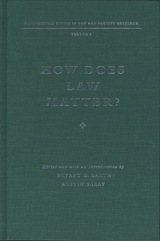
These essays show how law is relevant in both an "instrumental" and a "constitutive" sense, as a tool to accomplish particular purposes and as an important force in shaping the everyday worlds in which we live. Essays examine these issues by focusing on legal consciousness, the body, discrimination, and colonialism as well as on more traditional legal concerns such as juries and criminal justice.
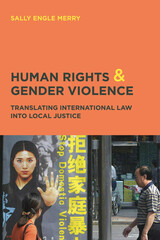
As an observer of UN diplomatic negotiations as well as the workings of grassroots feminist organizations in several countries, Sally Engle Merry offers an insider's perspective on how human rights law holds authorities accountable for the protection of citizens even while reinforcing and expanding state power. Providing legal and anthropological perspectives, Merry contends that human rights law must be framed in local terms to be accepted and effective in altering existing social hierarchies. Gender violence in particular, she argues, is rooted in deep cultural and religious beliefs, so change is often vehemently resisted by the communities perpetrating the acts of aggression.
A much-needed exploration of how local cultures appropriate and enact international human rights law, this book will be of enormous value to students of gender studies and anthropology alike.

Whether we are black, gay, Republican, women, or deaf, our associations--whether voluntary or assigned--constitute crucial and inescapable elements of our identities. Both voluntary and involuntary groups have been important in American history--more important than is generally recognized. But these groups have never been adequately addressed by law, which has as its primary focus the relationship between the individual and the state. The company we keep, says the constitutional law scholar Aviam Soifer, is presumed to be each person's own business, and generally beyond notice of the law. But as America becomes a more varied country and issues arising out of multiculturalism threaten to divide us, it becomes essential, Soifer argues, to recognize rights under the First Amendment that will protect the crucial roles of groups and communities within the larger national community.
Legal doctrine and the outcomes reached in judicial proceedings will be more coherent if we acknowledge that groups qua groups have significant legal impact. The building blocks of any quest for justice must include the groups--social, political, professional, civil, interpretive, religious--from which we derive and apply ethical standards in search of a better life. The ability to step outside traditional doctrinal boxes that concentrate on relationships between individuals and government will help not only legal thinkers but every person to reason toward justice.
Using history and literature to explore the complex issues of individual and group rights, Law and the Company We Keep is the first sustained account of the presence and importance of groups in our legal culture. It confronts central questions about the multiple roles of culture and symbol in defining our groups, and through them, our lives.
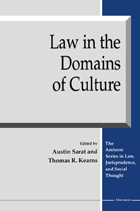
Law and legal studies are relative latecomers to cultural studies. As scholars have come to see law as not something apart from culture and society, they have begun to explore the connections between law and culture. Focusing on the production, interpretation, consumption and circulation of legal meaning, these scholars suggest that law is inseparable from the interests, goals and understandings that deeply shape or compromise social life. Against this background, Law in the Domains of Culture brings the insights and approaches of cultural studies to law and tries to secure for law a place in cultural analysis. This book provides a sampling of significant theoretical issues in the cultural analysis of law and illustrates some of those issues in provocative examples of the genre. Law in the Domains of Culture is designed to encourage the still tentative efforts to forge a new interdisciplinary synthesis, cultural studies of law.
The contributors are Carol Clover, Rosemary Coombe, Marjorie Garber, Thomas R. Kearns, William Miller, Andrew Ross, Austin Sarat, and Martha Woodmansee.
Austin Sarat is William Nelson Cromwell Professor of Jurisprudence and Political Science, Amherst College. Thomas R. Kearns is William H. Hastie Professor of Philosophy, Amherst College.
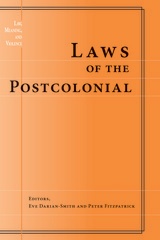
In perceptions of Western law there is an enduring disparity between law's pervasive power and its fragility. Many of these essays provide graphic accounts of law's tremendous shaping power in that massive occidental movement which settled and unsettled the globe. These accounts point to the West's encompassing and transforming of other peoples and other legal systems in ways which constitute and confirm the West in its own self-creation. Other essays deal with situations "within" the West which show how its identity is created, sustained, and also challenged in a constant reference to those contrary "others" which a powerful law has shaped and transformed. This challenge comes not least from the resistance of those "others" --resistances that profoundly disrupt the West and its law, revealing them as fractured at the seemingly confident core of their own self-constitution.
Contributors include Antony Anghie, Rolando Gaete, Alan Norrie, Dianne Otto, Paul Passavant, Jeannine Perdy, Colin Perrin, Annelise Riles, Roshan de Silva, and John Strawson, in addition to the editors.
Eve Darian-Smith is Assistant Professor of Anthropology, University of California, Santa Barbara. Peter Fitzpatrick is Professor of Law, Queen Mary and Westfield College, University of London.
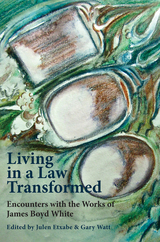
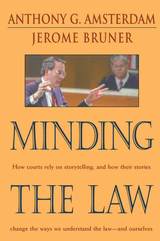
In this remarkable collaboration, one of the nation's leading civil rights lawyers joins forces with one of the world's foremost cultural psychologists to put American constitutional law into an American cultural context. By close readings of key Supreme Court opinions, they show how storytelling tactics and deeply rooted mythic structures shape the Court's decisions about race, family law, and the death penalty.
Minding the Law explores crucial psychological processes involved in the work of lawyers and judges: deciding whether particular cases fit within a legal rule ("categorizing"), telling stories to justify one's claims or undercut those of an adversary ("narrative"), and tailoring one's language to be persuasive without appearing partisan ("rhetorics"). Because these processes are not unique to the law, courts' decisions cannot rest solely upon legal logic but must also depend vitally upon the underlying culture's storehouse of familiar tales of heroes and villains.
But a culture's stock of stories is not changeless.
Amsterdam and Bruner argue that culture itself is a dialectic constantly in progress, a conflict between the established canon and newly imagined "possible worlds." They illustrate the swings of this dialectic by a masterly analysis of the Supreme Court's race-discrimination decisions during the past century.
A passionate plea for heightened consciousness about the way law is practiced and made, Minding the Law will be welcomed by a new generation concerned with renewing law's commitment to a humane justice.

In this imaginative exploration of modern legal culture, Lawrence Friedman addresses how the contemporary idea of individual rights has altered the legal systems and authority structures of Western societies. Every aspect of law, he argues--from civil rights to personal-injury litigation to divorce law--has been profoundly reshaped, reflecting the power of this concept.
The new individualism is quite different from that of the nineteenth century, which stressed self-control, discipline, and traditional group values. Modern individualism focuses on the individual as the starting and ending point of life and assumes a wide zone of choice. Choice is vital, fundamental: the right to develop oneself, to build up a life uniquely suited to oneself through free, open selection among forms, models, and lifestyles. With striking clarity and force, Friedman demonstrates how the new individualism results from changes in the technological and social framework of society. Loose, unconnected, free-floating, mobile: this is the modern individual, at least in comparison with the immediate past.
Written for the general reader as well as lawyers and legal scholars, The Republic of Choice offers keen and original observations about legal culture and the public consciousness that informs and expresses it.
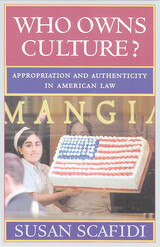
While claims of authenticity or quality may prompt some consumers to seek cultural products at their source, the communities of origin are generally unable to exclude copyists through legal action. Like other works of unincorporated group authorship, cultural products lack protection under our system of intellectual property law. But is this legal vacuum an injustice, the lifeblood of American culture, a historical oversight, a result of administrative incapacity, or all of the above?
Who Owns Culture? offers the first comprehensive analysis of cultural authorship and appropriation within American law. From indigenous art to Linux, Susan Scafidi takes the reader on a tour of the no-man's-land between law and culture, pausing to ask: What prompts us to offer legal protection to works of literature, but not folklore? What does it mean for a creation to belong to a community, especially a diffuse or fractured one? And is our national culture the product of Yankee ingenuity or cultural kleptomania?
Providing new insights to communal authorship, cultural appropriation, intellectual property law, and the formation of American culture, this innovative and accessible guide greatly enriches future legal understanding of cultural production.
READERS
Browse our collection.
PUBLISHERS
See BiblioVault's publisher services.
STUDENT SERVICES
Files for college accessibility offices.
UChicago Accessibility Resources
home | accessibility | search | about | contact us
BiblioVault ® 2001 - 2024
The University of Chicago Press









